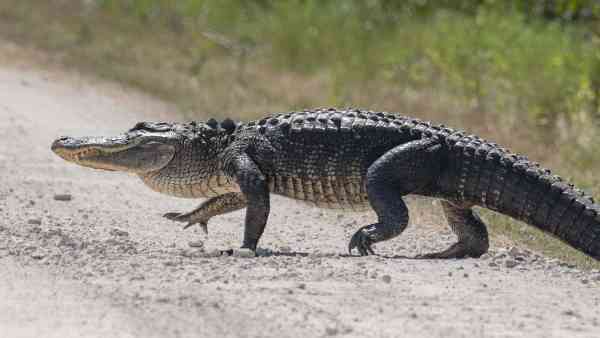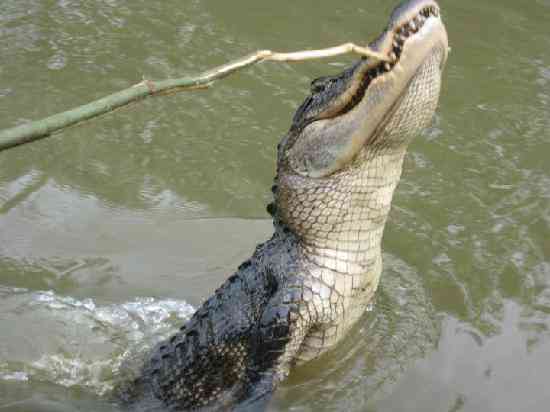Alligators are fascinating creatures that have been around for millions of years. They are known for their impressive size and strong jaws, but did you know that they also have an incredible sense of smell? In fact, alligators can detect the scent of blood from quite a distance away. With their powerful noses, they can even smell a single drop of blood in up to 10 gallons of water!
Table of Contents
That means that if you’re swimming in alligator territory and bleeding even just a little bit, you might be in trouble. These ancient animals are also able to sense the smell of dead animals from as far away as 4 miles.
How good is an alligator’s sense of smell?

Alligators are known for their impressive sense of smell, which is actually their most acute sense. Their nostrils, located at the tip of their snouts, are used not only for breathing but also for collecting odours. These smells are then transferred to the olfactory bulbs located in the gator’s skull.
These bulbs, as big as a walnut, play a crucial role in odour recognition and help these creatures detect a variety of smells. In fact, only the tip of the alligator’s snout needs to be above water to allow for breathing and odour detection. It’s fascinating to see how evolution has given alligators such a unique and extraordinary sense of smell, allowing them to thrive in their environment.
Can alligators smell blood in the water?
If you have ever encountered an alligator, you are well aware of its capacity to instil fear and display aggression. A common query people have is whether alligators possess the ability to detect the odour of blood in the water.
Although it may seem implausible, gators are indeed capable of sensing the scent present in the water! Their olfactory receptors are highly sensitive, enabling them to perceive the chemical compounds released by decomposing flesh or blood.
Moreover, alligators are not limited to detecting the smell of blood solely upon direct contact with it. They can actually discern the scent whether it is on land or in the air.
Their portrayal as bloodthirsty and merciless predators is not unfounded. Alligators rank among the most perilous creatures to have ever inhabited the Earth, as they relentlessly pursue and consume virtually any prey they come across.
Can alligators smell period blood?
Have you ever wondered if alligators can smell period blood? Well, unfortunately, the answer is yes. Alligators have an incredible sense of smell and are able to detect blood from long distances. This means that if you are on your period and in an area where alligators are known to reside, it’s best to steer clear.
Dusk and dawn are also times when alligators are most active, so it’s important to be extra cautious during those hours. The good news is that alligators aren’t typically interested in humans and will usually avoid any encounter. In fact, according to BBC, the likelihood of an alligator attack in the US is only 0.06 per 100,000 people per year.
Can alligators smell blood underwater?
Alligators are fascinating creatures, especially when it comes to their unique ability to hold their breath underwater for up to 24 hours. During this time, they drop to an incredibly slow heartbeat rate of only 2 or 3 beats per minute, which reduces their oxygen consumption and allows them to stay underwater for longer periods.
When they do need to breathe, they peek the tip of their snouts above the water’s surface to inhale. However, what’s even more interesting is that when they’re underwater, alligators close their nostrils, which means they’re not able to smell blood underwater.
Do alligators hunt by smell?
Alligators heavily rely on their senses to ensure their hunting prowess and overall survival. Among these senses, their olfactory abilities reign supreme. By utilizing their keen sense of smell, alligators can locate food, capture prey, and defend themselves.
The remarkable sensitivity of their nostrils enables alligators to navigate through water and also detect the presence of other alligators in their vicinity.
The significance of the alligator’s sense of smell becomes evident when considering their ability to successfully capture prey even in conditions of impaired vision. In such situations, alligators solely rely on their sense of smell and hearing to track down their quarry.

According to National Geographic, alligators exhibit twice the effectiveness in hunting when submerged underwater. They display a greater propensity for capturing creatures like crayfish or turtles compared to land mammals. This is attributed to their heavy reliance on sensory organs that enable them to perceive vibrations in their surroundings.
If you have ever been in close proximity to an alligator farm or observed these creatures in a zoo, you might have noticed that before initiating movement, they often raise their heads for several seconds, actively sniffing the air in search of any potential threats nearby. Just imagine the profound impact on our lives if we were to lose our own sense of smell!
FAQs
Do alligators smell menstruation?
It’s a common myth that alligators can smell menstruation. However, there is no evidence to support this claim. Alligators have an incredible sense of smell, but they primarily rely on it for hunting and detecting prey in the water. While they can detect the scent of blood, it’s unlikely that they would be able to distinguish between menstrual blood and any other type of blood.
Do crocodiles like human blood?
The answer, according to experts, is somewhat complicated. Crocodiles don’t necessarily have a preference for human blood over any other kind of blood, but they are attracted to the scent of blood in general. This means that if a human is bleeding, they may be more vulnerable to a crocodile attack.
Do crocodiles smell after eating humans?
While there is no clear evidence that suggests crocodiles produce a distinct odour after eating humans, researchers have found that these reptiles possess a remarkable ability to clean themselves after a meal. In fact, crocodiles have a special set of glands in their mouths that release powerful digestive enzymes and antimicrobial agents to rid themselves of any potential bacteria or germs.
Final Words
Well, it turns out that these apex predators have an incredibly acute sense of smell. In fact, alligators have one of the most refined olfactory systems in the animal kingdom, allowing them to detect the slightest scent of blood or animal carcass from miles away.
It doesn’t matter whether the prey is in water, on land, or even in the air; the alligator’s sense of smell is so powerful that it can track down its next meal with just one whiff. It’s no wonder these ferocious creatures are some of the top predators in their ecosystem.
Reference:
- https://www.pbs.org/wgbh/nova/crocs/wrestling/wrestling3.html
- https://en.wikipedia.org/wiki/Crocodile
- https://www.huffpost.com/archive/au/entry/killer-shark-or-crocodile-is-not-more-likely-to-do-it-again_a_21389908#:

Zahra Makda
Growing up enjoying the beauty of my village, a good passion for nature developed in me from childhood. Following my passion for the natural world, I have chosen zoology for my graduation, during my undergraduate degree, I participated in many nature trails, bird watching, rescues, training for wildlife conservation, workshop, and seminars on biodiversity. I have a keen interest in invertebrate biology, herpetology, and ornithology. Primary interests include studies on taxonomy, ecology, habitat and behavior.









